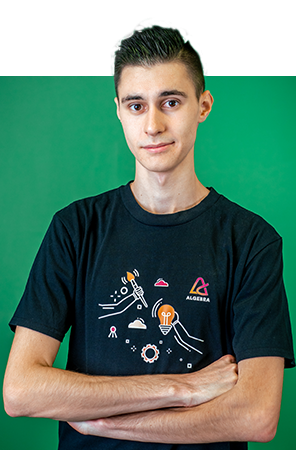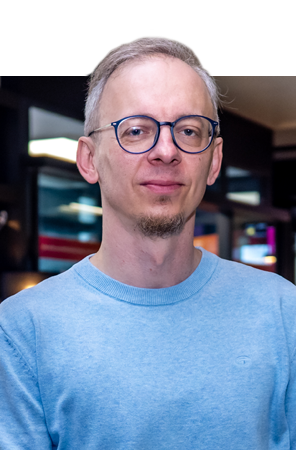No. 1 quality assurance system in Croatia
Creating a digital future in Croatia for 27 years
Institutional exchange agreements with more than 100 institutions
96% of alumni employed 3 months after graduation
Who is this study programme for?
This study programme is for those who…
- want to develop software solutions for different platforms (mobile, web, desktop), using modern software development approaches supported by artificial intelligence tools,
- want to combine creativity with critical thinking and learn how to turn an idea into a functional and high-quality software product,
- aspire to build a career in one of the most in-demand fields of the IT industry – software engineering.
And for those who…
- see themselves as future software architects or project managers who understand the entire development process, as well as how the latest technologies – including artificial intelligence – can be used for optimisation,
- want to learn about the latest technologies and trends such as robotics, machine learning, cyber security, and geoinformatics,
- are looking for a study programme that combines theory with practical knowledge and prepares them for the dynamic IT job market, where adaptability and critical thinking are key skills for the future.
If you want to turn your ideas into digital projects that make an impact, this study programme is the perfect starting point. While AI-powered tools accelerate and automate parts of the software development process, we prepare you to be the one who leads and manages them. Through hands-on work on applications and complex systems, you will gain the experience the industry demands. With the support of mentors and teamwork, you will develop critical thinking, creativity, and confidence in your knowledge – the key skills essential for success in a world where technology is evolving rapidly. By completing this programme, you will be ready for a career in which you can create solutions that transform the way people use technology.

Module overview by topics
Programming and Application Development
Programming, Object-Oriented Programming
Data Structures and Algorithms
Software Engineering
Mobile and Web Applications (Web 1–3, Mobile Applications)
Databases, Systems and Architecture
Introduction to Databases, Database Development
Operating Systems
Server Architectures, Advanced Application Development Based on Templates
Information System Security
Advanced Technologies and Specialisations
Introduction to DevOps – DevSecOps
Introduction to Machine Learning, Advanced Machine Learning
Robotics and Computer Vision
Applied Cryptography
Mathematics, Business and Professional Development
Mathematics, Mathematical Analysis, Statistics
Basics of Business Economics and Communication
Project Management, Entrepreneurship
Career Development Modules, Internship and Final Thesis
After completing the study programme…
…you will be able to work in jobs such as:
Software Developer – developing applications for web, mobile and desktop environments
Backend/Frontend Developer – specialising in either server-side or client-side application development
Database Developer/Administrator – designing and maintaining databases
DevOps Engineer – bridging development and operations, automating and optimising processes
AI/ML Developer – creating solutions based on machine learning
IT Security Specialist – ensuring the stability and security of information systems
Prompt Engineer/AI Integrator – optimising prompts and integrating generative AI into software solutions


The experience I gained through studying, competing, and leading the Esports Club taught me that every lost battle is an opportunity to learn, while every victory is an extra motivation to keep progressing. At Algebra Bernays University, I would especially highlight the expertise and professionalism of lecturers and teaching assistants, who are always ready to help and answer students’ questions. After completing my undergraduate studies, which prepared me for various roles in software engineering, I decided to deepen my knowledge by continuing in the graduate study programme. To all current and future students, my message is: be persistent and believe that the opportunities to achieve your dreams are always there, even if sometimes difficult to see.
Valentino Slavec, Founder of the Algebra Bernays Esports Club and Software Engineering student


Software development is undergoing a period of significant transformation driven by the emergence of large language models and modern AI-based tools. These tools are reshaping the way software is designed, implemented, and maintained, creating new opportunities but also challenges in terms of quality, security, and ethics. In this study programme, you will gain fundamental knowledge in programming, architecture, and the software life cycle, while also becoming familiar with the latest technologies shaping the future of the profession. Special emphasis is placed on critical thinking and the responsible use of artificial intelligence in software development. The aim of the programme is to equip students with the ability to combine classical principles of software engineering with disruptive AI technologies and to prepare them for an active role in driving innovation and leading change in the digital age.
Associate Professor Goran Đambić, Head of the University Department of Software Engineering
Examples of modules

Software Engineering
A module that introduces you to the world of professional software development. You will learn how programming teams operate, what agile methodologies are, and which practices are used to successfully complete projects. Through practical assignments in Java, you will connect programming with teamwork and project organisation, gaining skills that are essential for any career in IT.

Introduction to Machine Learning
In this module, you will become familiar with the basic algorithms of machine learning and their application to real-world problems. You will learn how to build predictive models, use classification and regression methods, and understand the advantages and limitations of different approaches. This is the first step towards understanding artificial intelligence in practice.
Dual degree
Study mode
On campus, Online
Language of delivery
English, Croatian
Study programme duration
8 semesters (4 years)
Semester duration
15 weeks of active teaching
+ 4 examination weeks
Total number of ECTS credits
240
Academic title
univ.bacc.ing.comp.
Bachelor in Software Engineering
Certifications obtained during studies

ECDL Start
(4 exams)

IT SMF
ITIL Foundation

Oracle Certified
Associate – OCA

Exam AZ-204: Developing Solutions for Microsoft Azure

Android certified application developer





